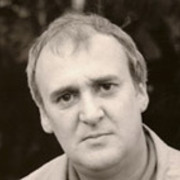
John Charles
John Charles is best-known in New Zealand as one of the country’s first composers to make his mark on film, thanks to his varied and distinctive scores for classics Goodbye Pork Pie, Utu and The Quiet Earth. He also spent time working in television as a producer and executive.
John Joseph Charles began playing piano while growing up in Wellington. Both his parents were musical. He studied arts at Victoria University, where he played music with the university jazz club. The next few years saw him working as both a newspaper journalist, and a programme officer for the NZ Broadcasting Corporation.
After finally completing his Bachelor of Music, he rejoined the NZBC as a producer and director (including doing both jobs on episodes of landmark drama series Pukemanu). His work as a director in the early 1970s ranged widely — from notorious bikie documentary If You're in it to the Limit and current affairs show Gallery, to forgotten teleplay Lunch with Richard Burton, and two episodes of early sitcom Buck House.
Although Charles moved to Australia in 1974, he would go on to compose music for a run of future Kiwi screen projects. Two years later saw his first feature-length score, for acclaimed tele-movie The God Boy.
Arguably Charles' key creative collaborator was jazz trumpeter turned filmmaker Geoff Murphy. Their association spanned decades. Charles first began playing with Murphy and charismatic drummer Bruno Lawrence back at high school. "We played anywhere we could find, the school library, anywhere." The trio continued to make music at the Victoria University Jazz Club, then in the 60s, at an upstairs club in the city, where musicians, actors, and petty criminals mixed.
In this period Charles worked on the music for Murphy’s first film, unfinished children’s musical The Magic Hammer (see photos here), and 1970 heist tale Tank Busters. Charles, Murphy and Lawrence would share adventures as part of Bruno's sprawling, travelling group Blerta, and on the Murphy-directed TV show of the same name. The trio also became brothers-in-law, after each married sisters from the same family.
In the late 70s and 80s, Charles and Murphy (plus Bruno) segued into feature films. The result was a trio of memorable soundtracks — the jazz-tinged Goodbye Pork Pie, the eclectic soundtrack for "Maori western" Utu, and the tension-filled Quiet Earth. Each won a release on vinyl.
When it came to Goodbye Pork Pie, director Murphy's background in music proved helpful in explaining what was needed; he "was specific in certain ways and very loose in others". Much of the soundtrack was played by a jazz quintet (including Bruno on drums, and prominent use of Australian alto-saxophonist Bernie McGann). Orchestral instruments take over as the film gets darker. The film is named after jazz legend Charles Mingus' instrumental Goodbye Pork Pie Hat, but efforts to get the rights went nowhere. Charles ended up writing a 'sound-alike': "It sounded a little bit like the Mingus song but went off and did other things".
The blockbuster local success of Goodbye Pork Pie helped Charles "terrifically in being offered jobs". He had told a friend that he expected the film's main audience would be kids and hoons: "It turned out there were about one and a half million of them."
The soundtracks for Utu and The Quiet Earth were much grander affairs; it was claimed at the time that Utu was the first feature film that the full NZ Symphony Orchestra had played on. End of the world tale The Quiet Earth starred Bruno Lawrence; the accompanying soundtrack release proved to be one of Charles' most successful. Charles would also appear in, and provide the score for, a memorable documentary about the multi-talented Bruno: Numero Bruno.
Elsewhere, Charles composed the music for 1984 tele-movie Iris, based on the life of poet Iris Wilkinson (pen name Robin Hyde), and collaborated with Lost Tribe composer Dave Fraser on Constance, which referenced Hollywood melodramas of the 1940s.
Charles also spent periods working in television on both sides of the Tasman. In the mid 1970s he worked in Sydney, at the music department of public broadcaster ABC Television, "directing mostly fine music programmes — concerts, operas, recitals, studio-based magazine-type music programmes with visiting conductors and soloists". Returning to Wellington in 1978, Charles spent two years as Head of Entertainment Programmes for Television One.
In 1980 he returned to Sydney, and ABC-TV. By the time he composed The Quiet Earth soundtrack in 1985, Charles was permanently based in Australia, where he worked as a freelance composer, arranger, pianist and TV director. But he continued to compose for New Zealand projects, including WWll romance A Soldier’s Tale, Geoff Murphy's last fictional feature Spooked, and two ambitious miniseries — Bread & Roses (based on the early life of politician Sonja Davies), and Fallout (a dramatisation of political battles when New Zealand went anti-nuclear).
Charles also composed music for award-winning miniseries The Sound and the Silence (1992), a Kiwi-Canadian production about inventor Alexander Graham Bell. His favourite soundtrack from his own work was comical TV movie The Perfectionist (1985), directed by an old NZBC colleague, Chris Thomson.
In 1996 Charles joined the Australian Film Television and Radio School, as composer in residence, where he taught screen composition for over a decade. He continued to play piano in different bands for many years.
John Charles died on 7 May 2024. He was 83.
Profile updated on 17 May 2024
Sources include
'John Charles' SOUNZ website. Accessed 17 May 2024
Joy Aberdein, 'John Charles' AudioCulture website. Loaded 10 February 2023. Accessed 17 May 2024
Nick Bollinger, Jumping Sundays - The Rise and Fall of the Counterculture in Aotearoa New Zealand (Auckland; Auckland University Press, 2022)
Barbara Cairns and Helen Martin, Shadows on the Wall - A Study of Seven New Zealand Feature Films (Auckland: Longman Paul, 1994)
'John Joseph Charles' - The Sydney Morning Herald, 11 May 2024
Pauline Kael, State of the Art: Film Writings 1983 -1985 (New York: E.P. Dutton, 1985)
Utu press kit